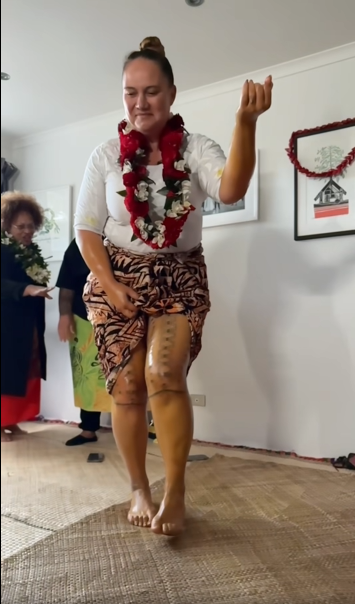New Zealand Deputy Prime Minister Carmel Sepuloni embarked on a profound journey within the cozy confines of her Titirangi residence. Surrounded by her closest companions and loved ones, she embraced a significant cultural tradition—the traditional Samoan women’s tattoo known as the malu.
Sepuloni’s decision to undergo this transformative process came after her visit to Samoa’s Independence Celebration in June, 2023. Following her return, she promptly scheduled the date for this week, the first week of July to wholeheartedly embrace the traditional malu and become one of the few New Zealand politicians who proudly wear a traditional tatoo. The month of July holds significance as the month of the Maori New Year celebration known as Matariki. During Matariki, families and communities come together, to engage in traditional rituals and celebrate the connections between the natural world, ancestors, and future generation.
The room exuded a distinct spritual ambiance as Tufuga (tattoist) Li’aifaiva Imo Levi skillfully wielded the traditional tool, crafted from bone or pig’s tusks, and his assistant carefully infused the ink into Sepuloni’s skin. The intense, but enduring experience lasted for approximately six hours.
Describing the sensation, Sepuloni likened it to the rhythmic puncturing of skin by an industrial gun stapler. Some individuals have compared the pain to childbirth, while others believe it occupies a realm of pain unique to itself. Nevertheless, Sepuloni emphasized the importance of transporting oneself to a reflective place where connections with family, ancestors, and the homeland are strengthened. These deep reflections serve as sources of strength during the process.
The significance of the malu had resonated with Sepuloni since her teenage years when she first encountered the tradition. While friends began getting tattoos, she felt an innate resistance within herself. It wasn’t until she witnessed the malu that she recognized her desire for this particular ink on her skin. The decision to embark on this journey was a matter of timing and feeling deserving of such a sacred cultural symbol. Although traditionally reserved for the daughter of a high chief or someone from a highly ranked family, Sepuloni emphasized her worthiness through her commitment to service and dedication to her community.
Securing the blessing of her Samoan Tongan father, Fa’atali’i Kamisi Sepuloni, was an essential step in her journey. Initially opposed to the idea, her father eventually embraced and supported her decision. On the day of the tattooing, poignant scenes unfolded—a community of supporters clapped and sang old Samoan songs, fellow Pacific MP sisters held Sepuloni’s hands, and her husband, Daren Kamali, serenaded her with a soft Fijian melody, offering comfort during emotional moments.
Looking ahead, Sepuloni’s future within Samoan culture remains open. When asked about considering a matai (chief) title, she playfully defers the decision to her family, acknowledging that each step should be taken one at a time.





